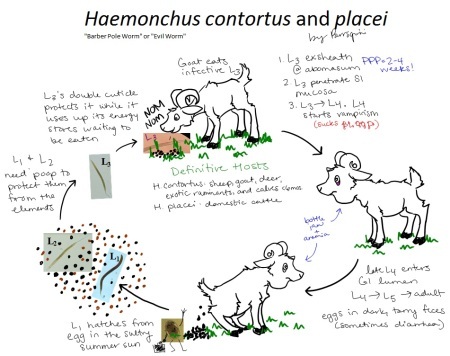Teaching Excellence Award Winner
 Thursday, May 19, 2011 at 02:34AM
Thursday, May 19, 2011 at 02:34AM Congratulations to Dr. Linda Mizer, Anatomy Professor at Cornell University, chosen as the 2011 SAVMA Teaching Excellence Award Winner!
Hear what some of Dr. Mizer's students had to say about her above and beyond commitment to her students and teaching:
"One of Dr. Mizer’s most notable quotes during this past year has been “Life goes on!” She understands that veterinary students have high expectations for themselves and have been used to mastering concepts in their undergraduate education. It can become frustrating when students enter their first year of vet school and have to make the realization that they indeed cannot know everything. Dr. Mizer encourages us to not sweat the small stuff, and even tells us how difficult some of the concepts were for her when she was in vet school. Another example of this methodology is during our anatomy labs. Our group would be on a journey to find an obscure artery, nerve or other structure. After we had pretty much dissected away any evidence that the structure we were looking for had ever existed, we would call her over in exasperation. “Well, there’s always the other side!” she would say, and would point us to the matching bilateral structure, instead of chastising us for poor dissection techniques like some might have done. "
"Part of Dr. Mizer’s success as a great instructor and mentor is her wonderful personality. As a first-year student, I was extremely relieved to have such an approachable and personable faculty as Dr. Mizer to encourage me along the way. She always welcomes questions and is always willing to meet with students outside of classrooms in order to clarify any confusion. The small group discussion setting also allowed us the chance to develop a relationship on a more personal level. As part of her didactic strategy and great personality, she often shared with us anecdotes from her previous experiences to help relate to our problems. I felt a great deal more relatable to her after hearing her stories, and subsequently I was able to learn very efficiently in a more comfortable environment.
Outside of the classroom, Dr. Mizer strengthens her bond with students and faculty by participating in extracurricular events. She is the SCAVMA faculty advisor, frequently attends and donates to student fundraising events, and has been known to dress up like a trucker to be a judge for our “Misster Cornell” pageant, a cross-dressing talent show fundraiser for breast cancer research."
"During our very last anatomy lecture, Dr. Mizer delivered a talk on the equine stay apparatus. Knowing that not every student was familiar with the general equine anatomy, Dr. Mizer had prepared a fresh specimen of an equine pelvic limb. She was dressed in scrubs and stood on top of the first row of lecture table with a pelvic limb in her arm, nearly as tall as her. Aside from the levity that has ensued upon seeing this, her use of this teaching aid had a tremendous impact on how my colleagues and I have learned the equine stay apparatus. We could all remember Dr. Mizer holding the limb, simulating the scenario of a horse during some basic slow gaits while physically manipulating the joints. Seeing is believing, and on that day we all believed that the stay apparatus actually does work in the horse, and we learned this material while having fun."
Congratulations again to Dr. Mizer and remember, as this year is coming to a close, take the time to thank the exception faculty who have been part of your educational experience!
 Cornell,
Cornell,  Teaching Excellence Award in
Teaching Excellence Award in  SAVMA News
SAVMA News 


